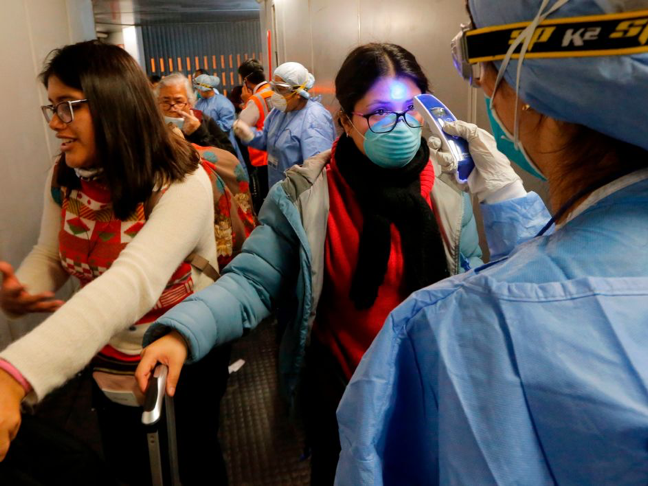
(above) Peruvian citizens being scanned at the airport for fever. Luka Gonzales / Getty Images
Peru reverses its controversial gender-based lockdown, quarantining men and women on different days, after intense backlash
April 13, 2020 - Original article: Business Insider Singapore
Canela López, Business Insider US
Peruvian President Martín Vizcarra cancelled a controversial measure to control the novel coronavirus that called for quarantining men and women on different days of the week on April 10.
• Peru’s President Martín Vizcarra overturned a controversial measure on April 10 that called for men and women to be quarantined on different days of the week to control the novel coronavirus.
• Canceled merely eight days after it was passed, the measure called for men only to leave their homes Mondays, Wednesdays, and Fridays, and women only on Tuesdays, Thursdays, and Saturdays.
• Farid Matuk – a member of Peru’s COVID-19 task force – said that the measure did not work because women are typically tasked with more domestic work which forced them to gather in large groups on their designated days.
• The measure was also met with backlash from LGBTQ+ activists because transgender and non-binary people faced increases street harassment by police.
• Visit Insider’s homepage for more stories.
Canceled merely eight days after it was passed on April 2, the regulation stated men could only leave their houses Monday, Wednesdays, and Fridays and women could leave their houses Tuesdays, Thursdays, and Saturdays. No one would be allowed outside on Sundays.
“We have to get fewer people to be on the streets every day,” Vizcarra said during a press conference announcing the regulations.
Vizcarra explained during the press conference that the gendered days are an attempt to reduce street traffic and make it easier for security forces to enforce quarantine regulations.
The new measures were supposed to be in place until April 12 but were overturned two days prior the original date. According to the BBC, the measure was overturned partially for being ineffective in minimizing the amount of people in the streets at a time.
Farid Matuk – a member of Peru’s COVID-19 task force – said that the measure did not work because women are typically tasked with more domestic work then men, which forced them to gather in large groups on their designated days.
As the situation in Peru has intensified, stricter regulations have been passed and the country’s state of emergency has been extended to April 26. Only one person per family is allowed to leave the house to buy food or medicine from Monday to Saturday.
Peru was the second country to implement gendered quarantine regulations after Panamanian President Laurentino Cortez announced that starting April 1 and ending April 12, women would only be able to leave their homes Mondays, Wednesdays, and Fridays and men would only be able to leave their homes on Tuesdays, Thursdays, and Saturdays.
As in Peru, no one is allowed outside on Sundays in Panama. While Peru’s measures have been overturned, Panama’s remain in place.
LGBTQ+ people reported increased street
harrasment due to the measures –
which spurred some Peruvians to speak out
Some activists and LGBTQ+ Peruvians were worried that transgender, non-binary, and queer people who present as visibly gender-nonconforming would be disproportionately impacted by the new rules, since police were instructed to stop people who are violating the quarantine days based on gender presentation.
“Given the new measures announced by @MartinVizcarraC and given the #transphobia that exists in #Peru, it is necessary for the State to guarantee that #trans people go outside the day they feel most comfortable,” Twitter user Horacio Rodríguez wrote.
Vizcarra said during the press conference that police officers have been told to respect the gender identities of transgender and non-binary people.
“The armed forces and national police will have clear instructions so that this is not at all a pretext for any homophobic measure,” Vizcarra said in a livestream video.
Despite Vizcarra’s assurances that the measures would not increase street harassment for transgender and non-binary Peruvians, many still reported instances of increased policing due to the measures.
Alexandra Arana told El Comercio that she was stopped by the police while walking to the market with her friend on April 4, a day designated for women to leave the house. Because Arana is a transgender woman, the sex on her national ID card says “male.”
Though she explained this to the police, the proceeded to misgender her and tell her to go home because it was not a designated day for men.
Instances of transphobia like what Arana faced were reported across the country during the eight days of the gendered COVID-19 policy.